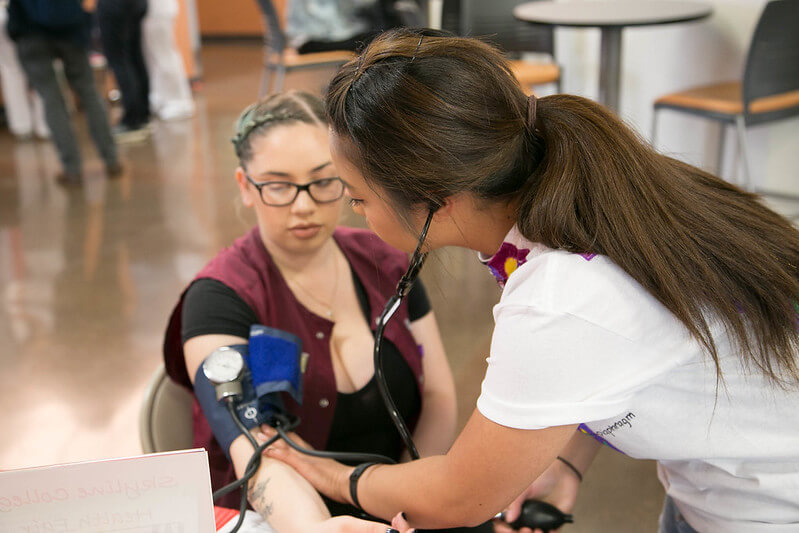Allied Health
Apply NowProgram Spotlight
The Allied Health Sciences provide students with foundational knowledge necessary for health careers and for transfer programs to four-year colleges and universities. Students take courses that are taught with contextualized instruction to bring students in step with healthcare occupational practices, while providing hands-on instruction. Students also have the benefit of an Allied Health learning community to support their academic success.

Careers in Allied Health professions are among the fastest growing in Northern California. A degree in Allied Health prepares students for further education and for careers in a broad array of health careers.
Skyline College offers an Associate of Science Degree in Allied Health that is specifically geared towards students who wish to continue their education at a four-year institution and ultimately find a career in the health field. Skyline College also offers certificates and degrees in related areas of Allied Health such as surgical technology, sterile processing technology, respiratory care, and emergency medical care.
Careers in Allied Health professions are among the fastest growing in Northern California. A degree in Allied Health prepares students for further education and for careers in a broad array of health careers. Salary ranges for these careers vary greatly depending on education level and most mid to advanced level careers require a four-year degree, and in many cases a graduate degree. The Skyline College program is an excellent resource to get you on the path to a higher degree.
Skyline College also offers certificates and degrees in the following Allied Health areas of study:
Looking for classes offered now?
Check out the current class schedule.| Program | Type | Total Units |
|---|---|---|
| Allied Health Science | AS | 60 Units |
| Program | Type | Total Units |
|---|---|---|
| Respiratory Care | BS | 60 Units |
| Respiratory Care | AS | 60 Units |
| Program | Type | Total Units |
|---|---|---|
| Surgical Technology | AS | 60 Units |
| Sterile Processing Technology with Clinical Practice | CS | 15 Units |
The Skyline College STEM Center brings together academic and student support services for students taking science, technology, engineering and math courses.
The center supports student success by ensuring students have access to resources such as academic tutoring, counseling services, a resource depository for STEM pathways and transfer, a hub for internships and work based learning opportunities, as well as a place where students and staff can collaborate and build a community and supportive connection.
Check out the STEM CenterSkyline College Allied Health Sciences has a new Simulation Laboratory located in Building 7, Room 7-211. The lab features state-of-the-art Gaumard adult, infant and premie tetherless simulators. The lab also includes full patient monitors, beds, standard clinical supplies and a video recording system.
Patient simulators can provide all vital signs, including heart & respiratory rates, pulses, lung sounds, pupil response and oxygen saturation. The manikins are able to realistically simulate virtually any medical problem or condition, including cardiac, respiratory, neurological, musculoskeletal and metabolic issues.
The patient simulators provide a total hands-on experience in which students are able to see the results of their actions in real time. Currently, the Simulation Lab is used for training students in the Surgical Technology, Respiratory Care, and Sterile Processing Technology programs.
If faculty at Skyline have any questions or would like to schedule some time in the lab, please contact Barbara Tovar, Lab Coordinator & Technologist at (650) 738-7928.
Upon completion of the program, students will be able to:
- Use aseptic technique in clinical and laboratory environments.
- Discuss and understand the role of microorganisms in healthy individuals and in infectious diseases.
- Demonstrate understanding of the structure of the human body.
- Demonstrate an understanding of the functions of the organ systems of the human body.
- Apply the concept of homeostasis to basic principles in medicine.
- Discuss and understand the principles of cellular metabolism, molecular genetics, and immunology.
- Demonstrate the ability to report scientific information appropriately and effectively.
- Utilize the scientific method to analyze and interpret data.
- Use the periodic table and other reference sources to gather information needed to solve chemical problems.
- Identify functional groups or reaction types and understand the role of biologically important molecules (carbohydrates, lipids, proteins, and nucleic acids) in the body.
Location: Building 7, Room 7130
Email: ranades@smccd.edu
The college catalog contains lists of all courses that we may offer in the current academic year. View the full course catalogs:
Areas of Study
Skyline College also offers certificates and degrees in the following Allied Health areas of study: